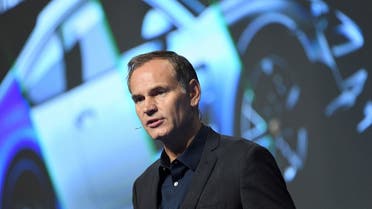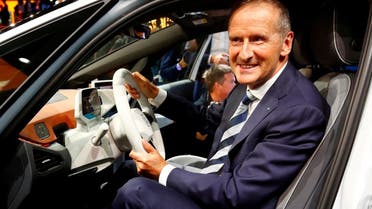
Oliver Blume, CEO of luxury car manufacturer Porsche AG, speaks at the Automobilwoche car summit in Ludwigsburg, Germany. (File photo: Reuters)
Reuters, Berlin/Frankfurt
Published: 25 July ,2022:
Volkswagen investors believe incoming CEO Oliver Blume will struggle to lead both the Volkswagen Group and Porsche -- and to pull off a planned listing of the sports car maker while wearing both hats.
Friday’s announcement that group CEO Herbert Diess would be replaced by Porsche boss Blume has rekindled investor concerns about corporate governance problems at Europe’s top carmaker, which some shareholders have said weighs on the stock’s performance.
For the latest headlines, follow our Google News channel online or via the app.
“Blume can’t take care of everything ... this underscores the bad corporate management at Wolfsburg,” said Ingo Speich, head of sustainability and corporate governance at top-20 Volkswagen investor Deka Investment, referring to the German carmaking group’s headquarters.
“It is poison for the Porsche IPO,” Speich added. Volkswagen plans to list the luxury cars division in the fourth quarter.
Porsche AG may already have to go public at a steep discount if it decides to go ahead with the listing as economic obstacles mount, Reuters reported last week.
Those concerns have been exacerbated by questions over how Blume can manage his dual role.
“Mr Blume will maintain his role as CEO including after a possible IPO,” Volkswagen said on Monday in response to Reuters’ questions.
Just days before his appointment was announced, Blume and other Porsche AG executives speaking at its capital markets day sold a possible listing of the sports car brand as a means to give it more independence and entrepreneurial freedom while raising funds for the group.
His dual role calls that independence into question, analysts at Stifel and UBS said.
“Such a double mandate can only exist temporarily in an emergency situation -- it won’t work in the long-term,” said Ulrich Hocker of the German Association for the Protection of
Securities (DSW), which represents retail investors.
Still, most do not at this stage expect a delay to the listing. Some, including car industry veteran Ferdinand Dudenhoeffer speculated Porsche finance chief Lutz Meschke may eventually take over from Blume at the sports car brand.
In its statement on Friday, Volkswagen did not outline any succession planning for Blume at Porsche.
Volkswagen’s share price has nearly halved since March 2021, underperforming a 17 percent drop in the STOXX Europe 600 Automobiles & Parts Index over the same period.
The carmaker answers to a complex web of investors -- its supervisory board controlled by workers’ representatives and regional government, and a holding company owned by the Porsche and Piech families, staffed in part with Volkswagen executives.
Porsche AG’s Meschke is on the board of Porsche Automobil Holding SE, Volkswagen’s top shareholder and owner of more than half its voting rights, while Volkswagen’s chairman Hans Dieter Poetsch is its CEO.
Tensions over who pulls the strings in Wolfsburg have spelled the end of the road for several Volkswagen executives before Diess, with former CEO Bernd Pischetsrieder and former VW brand chief Wolfgang Bernhard forced out of their jobs in the late 2000s after repeated clashes with the works council.
While Diess is largely given credit for Volkswagen’s pivot to electrification -- lifting the carmaker from the reputational ruin of the Dieselgate scandal to leading Europe’s electric car market -- the governance issues caused by his confrontational approach to leadership ultimately weighed on the investment case, analysts at Stifel Europe Equity Research said.
“Poor corporate governance makes many investors shy away,” Janne Werning, who heads ESG Capital Markets & Stewardship at Union Investment, a top-10 shareholder in Volkswagen, said at the carmaker’s annual general meeting (AGM) last year.
Union Investment, which repeated its criticism of Volkswagen’s governance at the most recent AGM in May, declined to comment for this article.
Volkswagen’s billionaire clan plotted CEO Diess’s ouster while he was on US trip

Herbert Diess, CEO of German carmaker Volkswagen AG, poses in an ID.3 pre-production prototype during the presentation of Volkswagen's new electric car on the eve of the International Frankfurt Motor Show IAA in Frankfurt, Germany. (File photo: Reuters)
Bloomberg
Published: 24 July ,2022
Volkswagen AG’s dramatic move to oust its combative chief executive officer was set in motion a week ago, when his backing from the billionaire Porsche and Piech family began to crumble.
Unwavering support from the reclusive clan that majority-owns VW had helped Herbert Diess survive frequent clashes with powerful worker representatives. But as key project failures combined with worker discontent, the family concluded he had to go.
The decisive day was July 20, according to people familiar with the deliberations. The top committee of VW’s supervisory board, comprising family representatives, officials from the German state of Lower Saxony officials and labor leaders, determined Diess’s time was up. He learned this around lunchtime the next day, still jet-lagged from a visit to the automaker’s SUV factory in Chattanooga, Tennessee.
In the end, Diess’s undoing is a brutal reflection of the challenges facing leaders of industrial behemoths trying to modernize for the digital age. VW’s unions wield significant influence even by German standards, where worker representatives account for half the seats on supervisory boards. Their leaders and the state are resistant to drastic and expedient change that will compromise jobs.
While Diess excelled at setting a strategic direction for VW, his delivery ruffled feathers and the company’s execution has been patchy. The outsider brought in from BMW AG in 2015 didn’t accumulate enough allies and became increasingly isolated. Threats of cost cuts and delays developing software for the vehicles of tomorrow ultimately cost him his position.
“The departure of CEO Herbert Diess should not be a surprise given how marginalized he had become in recent months,” Philippe Houchois, a Jefferies analyst, wrote in a report. “The timing is unfortunate and another illustration of dysfunction at VW.”
Spokespeople for VW declined to comment on the events leading up to Diess’s dismissal.
Software woes
Momentum to remove Diess before VW’s summer break started building last weekend during individual discussions among the eight-member presidium within its supervisory board. Diess was in the US to shore up progress in a market where Europe’s biggest carmaker has long lagged.
While the top executive was away, key representatives of VW’s main stakeholders started contemplating who could replace Diess should tensions within the company worsen. There have been repeated flare-ups, including late last year, when Diess warned the company risked falling behind Tesla Inc. and mused about major job cuts. In December, VW overhauled its management board, stripping Diess of some responsibilities while tasking him with leading Cariad, the carmaker’s software unit.
Since then, discord at Cariad has pushed back the scheduled rollout of important new models, including the electric Porsche Macan SUV. His struggle to muster broader support to execute his 89-billion euro ($91 billion) electric-vehicle and software strategy started to fray support among Porsche and Piech family members.
The successor
During the deliberations of the last week, Porsche CEO Oliver Blume emerged as the heir apparent with his long history of key operational positions at VW and track record of rejuvenating the sports-car division. As VW’s power players weighed pros and cons of putting a new leader in charge, they started to tilt toward making a change.
Hours after Diess returned from Chattanooga, he was hit with the decision and given 24 hours to respond. After consulting with legal advisers, he decided it was time to go.
Diess informed VW Chairman Hans Dieter Poetsch on Friday. A meeting of the company’s 20-member supervisory board was called for 4:30 p.m. in Germany. Fifteen minutes before the start of the meeting, the presidium members informed their respective camps that Diess’s replacement was on the agenda. The board voted unanimously for his ouster.
Diess, credited with putting in place the industry’s biggest EV rollout, will make way for Blume in just over a month. He’s likely still entitled to be paid in full under his contract through October 2025. Depending on the automaker’s operating results and share performance, the amount could reach more than 30 million euros.
No comments:
Post a Comment